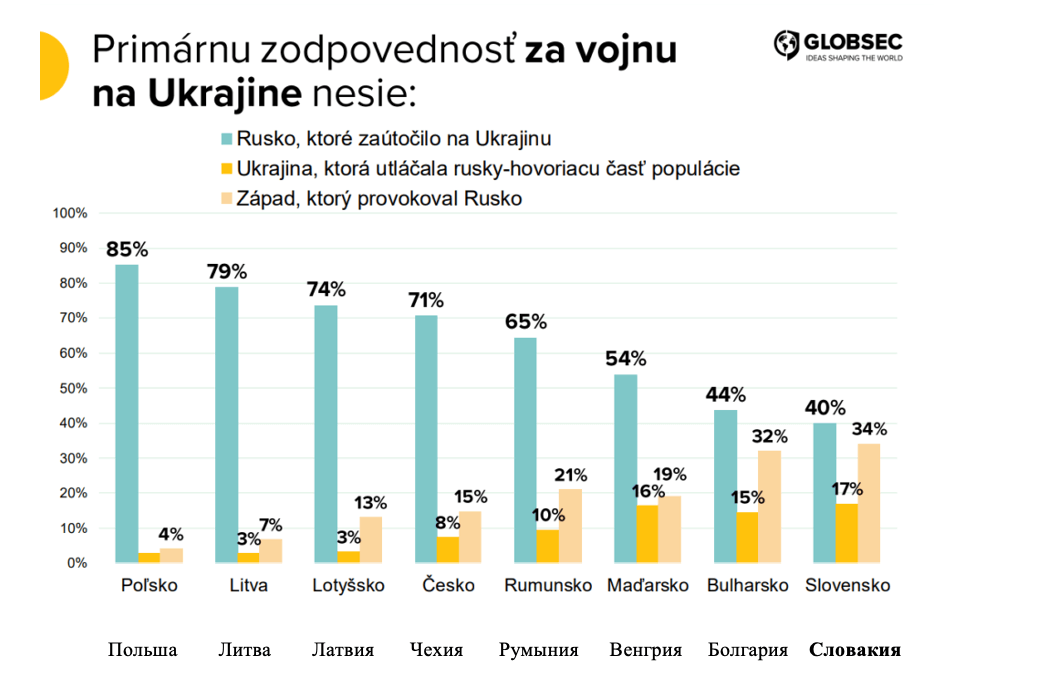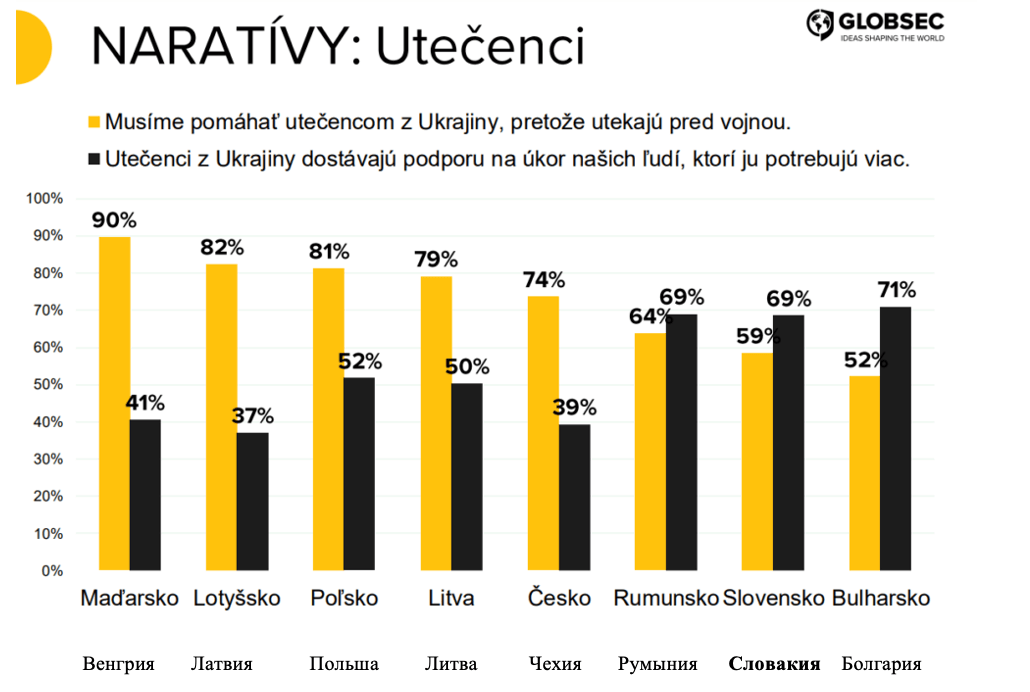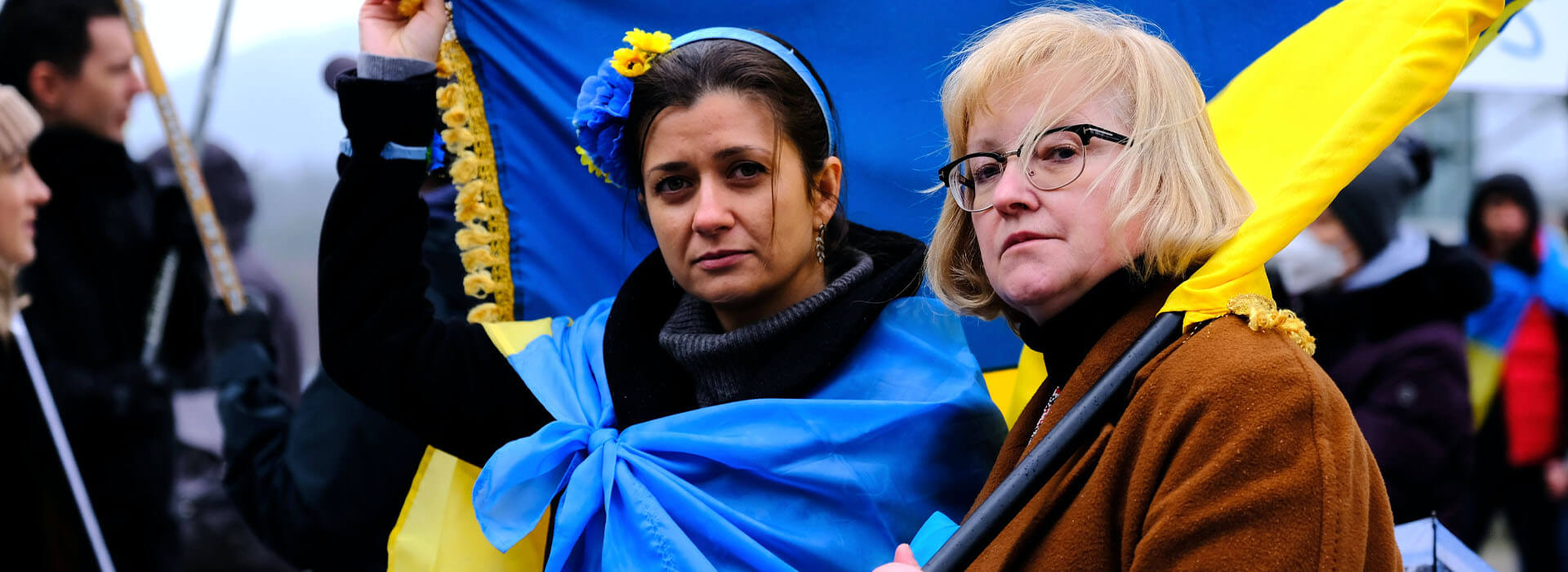In 2022, many European states, including Slovakia, faced a new wave of refugees caused by Russia’s military aggression against Ukraine.
In February 2022, the Russian army invaded Ukraine, a sovereign neighboring state. Since then, Russia has been continually inflicting rocket, artillery, and mortar strikes on Ukrainian cities and villages, mercilessly killing civilians, destroying military and civilian infrastructure, and committing war crimes that could be considered genocide against civilians. Russian aggression has led to a mass exodus of a huge number of citizens from Ukraine who are being sent mainly to Europe, including Slovakia, which borders Ukraine.
Thanks to its political leadership (president, government, parliament), Slovakia has taken a clear stance against Russian aggression. It has resolutely condemned Russia and supported the introduction of the most severe sanctions against the aggressor. Slovakia is providing Ukraine with comprehensive political, diplomatic, material, military, and humanitarian assistance.
An important component of the latter is Slovakia’s acceptance of Ukrainian refugees.
Crisis-2015: a memory of the future?
For a better understanding of what has been happening in Slovakia since February 2022 regarding the arrival of Ukrainian refugees and to understand how the attitude of the state and citizens towards people seeking shelter from the horrors of war has changed calls for a look back at 2015.
That year, a crisis erupted in Europe with refugees arriving here from countries of the Middle East, Afghanistan, Africa, and other states suffering from prolonged wars and armed civil conflict. Despite the fact that at that time the number of foreign nationals who applied for asylum in the countries of the Visegrad Four (V-4), including Slovakia, were incomparably lower than in other states of Western Europe, and that these countries (with the exception of Hungary) were passed over by the mass flow of refugees, the positions of the governments of the V-4 countries on this issue were marked by a clear reluctance to participate in the sharing of responsibility with other EU member states.
The V-4 group was the toughest opponent to the idea of distributing migrants among European states. Maintaining that they opposed the introduction of a quota system for the redistribution of migrants, the V-4 have effectively refused to accept refugees.
In Slovakia at that time, populist politicians blew up the issue of resettlement of a group of 150 Christians from the Middle East as if it were a global crisis. In the town of Gabčíkovo in southwestern Slovakia, the local council held a referendum on refusing to accept 500 refugees from nearby in Austria for temporary stay in a local hostel intended for migrants who, by agreement with the Austrian government, were transferred there for several weeks from a similar, at that time overcrowded, institution.
In February 2022, Russian aggression against Ukraine commenced, a new wave of refugees flooded into Europe, and everything changed, from statistics to politics to people’s attitudes.
Slovak assistance from the state and individuals to Ukrainian refugees
According to statistics available at the end of May 2023, beginning February 24, 2022, 1,405,000 people have arrived in Slovakia from Ukraine, and 1,205,000 people have crossed the Slovak-Ukrainian border moving in the opposite direction over the same period of time. Over this period, a total of more than 115,000 Ukrainian citizens have received temporary asylum in Slovakia.
In 2022, the Slovak government, using a special program funded by the European Union, introduced benefits intended for the resettlement of Ukrainian citizens and to cover other living expenses. In 2023, Slovakia set aside a significant part of its share in the European Recovery Fund package to help Ukrainian refugees, which it was unable to use up. The amount of assistance provided through the Fund totals about half a billion euros.
Citizens of Slovakia and non-governmental organizations together with citizens remaining in Ukraine collected tens of millions of euros to assist Ukrainian refugees in Slovakia and prepared and sent thousands of tons of goods with material assistance. Thousands of volunteers took part and continue to take part in programs to help Ukrainians in Slovakia, with some assisting Ukrainians directly in Ukraine.
Important changes were seen in the views of residents towards having migrants from foreign countries in Slovakia during the initial period of the war. Following the migration crisis of 2015, during which most Slovak politicians cultivated anti-immigrant sentiments, the people faced a new challenge in opening their arms to Ukrainian women and children expelled from their homeland by the war and in providing them with at least temporary asylum.
According to opinion polls in January 2022, although 42% of the Slovak population still felt a sense of distance towards refugees in a generalized sense, a month later – when Russia attacked Ukraine – the issue of attitudes towards refugees was no longer an abstract topic, referring now to specific people, to citizens of a neighboring state fleeing the war and, foremost, towards defenseless women and children.
According to a survey conducted by FOCUS polling agency in February-March 2022, the vast majority of respondents (86%) were in favor of taking them in. The views of Slovaks on having refugees as neighbors also changed. 71% of respondents said having refugees would not be a problem with only 29% saying they would. The data indicated a significant reduction in social distance towards refugees compared to January 2022. Most people in Slovakia spoke in favor of helping Ukrainians arriving, even though at the same time many were still wary of refugees arriving.
Shifts in public opinion during the first year of the war
Russian aggression against Ukraine has influenced the views of Slovak citizens on foreign policy. Immediately after Russian troops’ invasion of Ukraine, opinion polls showed that the level of support for Slovakia’s membership in the EU and NATO increased considerably, that a significantly larger proportion of citizens began to see Russia as a threat to the security of their country, and that the level of trust in Russian leader Vladimir Putin fell.
All this could be considered a manifestation of a more rational approach by Slovaks to foreign policy issues and evidence of the strengthening of the pro-Western direction in what people sought in foreign policy. In general, this could be seen as a positive shift in societal attitudes that, among other things, looked to strengthen citizen support for state policy aimed at helping Ukraine as a victim of Russian aggression.
A year after the beginning of the full-scale war, however, public opinion in Slovakia is showing an opposite trend. Although there has not yet been a complete rollback from planned progressive trends in views on foreign policy and polling data do not indicate a complete return to previous positions, the unfavorable changes cannot be ignored. When explaining their causes, there are four aspects that could have negatively influenced the situation over the past year:
- reduction of public confidence in the ruling parties and their representatives due to acute internal conflicts and insufficiently effective and sometimes simply chaotic management of the country
- deepening socio-economic problems as a result of the general global economic situation
- active penetration of anti-Western and anti-Ukrainian propaganda into Slovak society through Russian state media channels and the media disinformation machine as well as by their Slovak agents who utilize local pro-Russian online platforms
- opposition parties activities that, in their mobilization strategies, incorporated criticism of both the domestic and socio-economic policy of the center-right government and of pro-Russian and anti-Ukrainian positions in matters of foreign policy, security, and defense.
The two graphs below from a sociological survey conducted in March 2023 by the Slovak analytical center GLOBSEC clearly show the differences in the views of people of individual states of Central and Eastern Europe on two issues related to Russia’s aggression against Ukraine – responsibility for starting the war and attitudes towards Ukrainian refugees. According to survey responses on these questions, Slovakia was at the tail end of the list of countries under review.

Figure 1: Responsibility for starting the war
Primary responsibility for the war in Ukraine rests with:
=== Russia, which attacked Ukraine
=== Ukraine, which oppressed the Russian-speaking population
=== the West, which provoked Russia
The survey data shown in Figure 1 demonstrates that Russian propaganda actors and local agents of Russian influence succeeded in the year since the outbreak of the full-scale war against Ukraine in convincing a large part of the Slovak population that responsibility for this does not lie with the aggressor. This fact testifies to a diminished ability of this segment of Slovaks to judiciously evaluate information and draw rational conclusions that logically follow from the facts under consideration.

Figure 2: Attitudes towards Ukrainian refugees
Narratives: Refugees
=== We should help Ukrainian refugees because they are fleeing from the war
=== Refugees from Ukraine receive assistance from our fellow citizens who need it more
The data presented in Figure 2 shows that a significant proportion of the Slovak population (fortunately, not yet a majority, but by no means marginal) does not consider it necessary to come to the aid of people fleeing the war. The proportion of residents who think that assistance to Ukrainian refugees worsens the social situation of Slovak citizens exceeds that of those who are in favor of assistance. This is most likely the result of the activities of local pro-Russian opposition figures who are attempting to convince the population that, given the country’s economic problems, the government should only care about its own citizens. At the same time, Slovak pro-Russian populists and right-wing extremists have been going out of their way to create a hostile, essentially antagonistic attitude towards Ukrainians among the population, acting together with Moscow coordinators.
Everything could be decided in the elections in September
Early parliamentary elections will be held in Slovakia at the end of September 2023. One of the key issues around which a struggle between competing political parties can already be witnessed is comprehensive support for Ukraine. The continuation or change of the current policy regarding this depends on the results of the elections. Election results may also influence potential shifts in public opinion, either towards deepening solidarity with Ukraine and its citizens and strengthening the country’s position as a reliable ally and partner within NATO and the EU, or towards national egoism, greater distance from the West, and a move towards Russia.
Материал доступен на русском языке: Украинские беженцы в Словакии: объект российской агрессии и пропаганды










